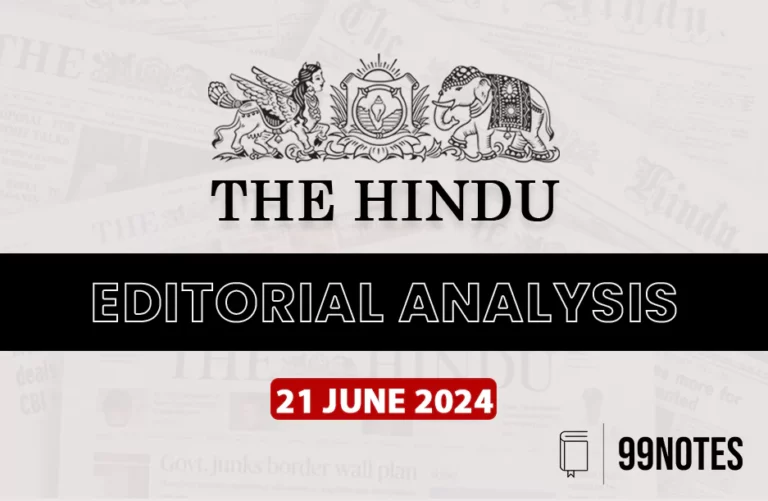23 March 2024 : The Hindu Editorial Notes PDF
The Hindu EDITORIAL
23-March-2024
1. The CAA, Muslim exclusion and the lens of the right
| Topic: GS2 – Governance – Government Policies
The topic holds significance for UPSC as it touches upon historical, political, and ideological dimensions critical for understanding India’s socio-political landscape. |
| Context |
| ● The article discusses the exclusion of Muslims from the Citizenship (Amendment) Act (CAA) 2019, citing reasons including the complexities of Partition, persecution of minorities, and critiques of secular and political responses, within the broader context of Hindu right’s ideological politics. |
Reasons for Exclusion of Muslims from CAA 2019:
Partition and Its Implications:
- Partition primarily driven by Muslim elite in collaboration with colonial authorities and triggered by Hindu right’s vision of Hindu Rashtra.
- Majority of Indian Muslims opposed Partition; notable leaders like Khan Abdul Ghaffar Khan, Maulana Abul Kalam Azad, and Sheikh Abdullah resisted it.
- Bangabandhu Mujibur Rahman’s leadership in Bangladesh’s liberation contradicted Jinnah’s two-nation theory.
Complexities of Post-Partition Scenario:
- Confusion among Muslim masses evident in their decision-making during Partition, as highlighted by Maulana Abul Kalam Azad’s efforts to retain Muslim officials in India.
- Enormity of the situation reflected in the numbers of Muslims opting to stay in India despite initial inclinations towards Pakistan.
Argument of Persecution:
- Religious minorities and some Muslim sects face persecution in Pakistan, Bangladesh, and Afghanistan, substantiating the need for protective measures.
- Instances like Nobel laureate Abdus Salam’s discrimination due to his Ahmadi heritage underline the severity of persecution.
- Even Shia community leadership opposed Pakistan project as favoring Sunni dominance.
Critique of Secular Response and Current Political Climate:
- Criticism towards India’s secular governments for not adequately addressing persecution of religious minorities.
- Unfortunate intervention by Delhi Chief Minister Arvind Kejriwal, depicting asylum seekers as criminals, deemed xenophobic and derogatory.
- Hindu right’s broader ideological agenda evident in BJP’s non-fielding of Muslim candidates, scrutiny of madrasas, and emphasis on de-Islamisation of India.
Conclusion:
- CAA 2019’s exclusion of Muslims intersects with complex historical and political dynamics, including Partition’s legacy, post-Partition challenges, and ongoing persecution of religious minorities.
- Critique of secular response and current political rhetoric highlight the need for nuanced understanding and comprehensive political strategies to address the broader ideological project of de-Islamisation unfolding in India.
| The Citizenship Amendment Act 2019: |
| About:
● The Act seeks to amend the definition of illegal immigrant for Hindu, Sikh, Parsi, Buddhist, Jains and Christian (but not Muslim) immigrants from Pakistan, Afghanistan and Bangladesh, who have lived in India without documentation. ● They will be granted fast track Indian citizenship in 5 years (11 years earlier). ● The Act (which amends the Citizenship Act 1955) also provides for cancellation of Overseas Citizen of India (OCI) registration where the OCI card-holder has violated any provision of the Citizenship Act or any other law in force. Who is eligible? ● The CAA 2019 applies to those who were forced or compelled to seek shelter in India due to persecution on the ground of religion. It aims to protect such people from proceedings of illegal migration. ● The cut-off date for citizenship is December 31, 2014, which means the applicant should have entered India on or before that date. ● The act will not apply to areas covered by the Constitution’s sixth schedule, which deals with autonomous tribal-dominated regions in Assam, Meghalaya, Tripura, and Mizoram. ● Additionally, the act will not apply to states that have an inner-line permit regime (Arunachal Pradesh, Nagaland and Mizoram). |
| What are the concerns About CAA, 2019? |
| ● Constitutional Challenge: Critics argue that it violates Article 14 of the Indian Constitution, which guarantees the right to equality before the law and prohibits discrimination based on religion.
● The CAA’s provision of granting citizenship based on religion is seen as discriminatory. ● Potential for Disenfranchisement: The CAA is often linked to the National Register of Citizens (NRC), a proposed nationwide exercise to identify illegal immigrants. ● Critics fear that a combination of CAA and a faulty NRC could disenfranchise several citizens who are unable to prove their documentation. ● More than 19.06 lakh people were left out of the final draft of the Assam NRC released in August 2019. ● Impact on Assam Accord: In Assam, there is a specific concern regarding the compatibility of the CAA with the Assam Accord, 1985. ● The Accord established criteria for determining citizenship in Assam, including specific cut-off dates for residency. ● The CAA’s provision of a different timeline for granting citizenship could conflict with the provisions of the Assam Accord, leading to legal and political complications. ● Secularism and Social Cohesion: The CAA’s focus on religion as a criterion for citizenship eligibility has raised broader concerns about its impact on secularism and social cohesion in India. ● Critics argue that privileging certain religious communities over others undermines the secular principles upon which the Indian state was founded and could exacerbate communal tensions. ●Exclusion of few Religious Communities: The exclusion of certain religious communities from the CAA and its subsequent rules, such as Sri Lankan Tamils and Tibetan Buddhists, who faced religious persecution in their home countries, raises concerns. |
| PYQ: With reference to India, consider the following statements: (2021)
1) There is only one citizenship and one domicile. 2) A citizen by birth only can become the Head of State. 3) A foreigner once granted citizenship cannot be deprived of it under any circumstances. Which of the statements given above is/are correct? (a) 1 only (b) 2 only (c) 1 and 3 (d) 2 and 3 Ans:Option (a) |
| Practice Question: Discuss the implications of the exclusion of Muslims from the Citizenship (Amendment) Act (CAA) 2019 in India. (150 Words /10 marks) |
2. Kejriwal’s arrest a reminder of dangers of misusing enforcement agencies
| Topic: GS2 – Indian polity, GS2 – Governance.
The article underscores the erosion of democratic norms and selective targeting of opposition leaders, critical for understanding governance challenges. |
| Context |
| ● The article highlights concerns over the arrest of Delhi Chief Minister Arvind Kejriwal by the Enforcement Directorate (ED), suggesting a political motive and selective targeting of opposition leaders, posing threats to democracy. |
Arvind Kejriwal’s Arrest and its Implications:
Political Motive Behind Arrest:
- Kejriwal’s arrest by the Enforcement Directorate (ED) before the general election raises concerns about democratic norms.
- Sequential arrests of AAP leaders, including Manish Sisodia and Sanjay Singh, indicate a pattern of targeting opposition figures.
Delay in Legal Proceedings:
- Despite registering cases in 2022, the ED’s failure to expedite legal proceedings suggests a lack of urgency in resolving corruption charges.
- Prolonged detention without trial undermines the principle of a fair trial and erodes public trust in the legal system.
Selective Enforcement of Law:
- Central agencies’ focus on opposition leaders while sparing those who align with the ruling party raises suspicions of selective enforcement.
- The Supreme Court’s demand for concrete evidence highlights the necessity for impartial investigations devoid of political bias.
Impact on Democratic Institutions:
- The arrest of constitutional functionaries like Kejriwal and Hemant Soren threatens the functioning of democratic politics.
- Over-reliance on central agencies jeopardises the autonomy of institutions and fosters a climate of political intimidation.
Critique of Central Agencies’ Actions:
- Central agencies’ actions are viewed skeptically as they coincide with political events and demonstrate a lack of transparency.
- The perception of central agencies as instruments of political vendetta undermines their credibility and the rule of law.
Reflections on Kejriwal’s Role:
- Kejriwal’s advocacy for anti-corruption measures juxtaposed with his own entanglement underscores the complexities of governance.
- While Kejriwal’s past actions may have contributed to his current predicament, they do not justify the disregard for due process.
Conclusion:
- The arrest of Arvind Kejriwal and other opposition leaders by central agencies raises questions about the integrity of law enforcement and the preservation of democratic values.
- Upholding the principles of fairness, impartiality, and accountability is essential to safeguarding democracy amidst political turbulence.
| Dangers of misusing enforcement agencies: |
| Implications of Misusing Enforcement Agencies:
● Erosion of Democratic Norms: Misuse undermines the rule of law, eroding public trust in democratic institutions. ●Selective Targeting: Targeting opposition leaders stifles dissent and weakens political pluralism, damaging the democratic process. ●Loss of Credibility: Instrumentalizing agencies for political ends diminishes their credibility, compromising their effectiveness in combating real crimes. ●Political Polarization: Misuse exacerbates political polarization, creating a hostile environment detrimental to governance and social cohesion. Way Forward: ● Strengthen Oversight Mechanisms: Enhance independent oversight to prevent politicization and ensure accountability of enforcement agencies. ● Uphold Rule of Law: Safeguard the autonomy of agencies to operate without political interference, upholding the principle of equality before the law. ● Promote Transparency: Increase transparency in agency operations and decision-making processes to enhance public trust and accountability. ● Legal Reforms: Implement legal reforms to delineate clear boundaries between political and law enforcement activities, preventing misuse. ● Civic Education: Foster civic education to promote awareness of democratic principles and the importance of respecting institutional integrity. |
| Practice Question: Discuss the implications of misusing enforcement agencies for political ends and suggest measures to safeguard democratic norms. (150 Words /10 marks) |
For Enquiry

23 March 2024 : Daily Current Affairs

23 March 2024 : PIB Summary for UPSC

23 March 2024 : The Hindu Editorial Notes PDF

23 March 2024 : Indian Express Editorial Analysis

22 Mar 2024 : Daily Current Affairs Quiz

22 Mar 2024 : Daily Answer Writing

22 March 2024 : Daily Current Affairs

22 March 2024 : The Hindu Editorial Notes PDF

22 March 2024 : PIB Summary for UPSC

22 March 2024 : Indian Express Editorial Analysis
Daily Current Affairs 23 March 2024 : Daily Current Affairs Daily Current Affairs
23-March -2024- Top News of the Day
1. Delhi Chief Minister Arvind Kejriwal Arrested…
March 2024 PIB 23 March 2024 : PIB Summary for UPSC PIB Summary for UPSC
23-March -2024
1. Ministry of Earth Sciences hosts Inter-Ministerial Joint Workshop…
March – The Hindu Editorial 23 March 2024 : The Hindu Editorial Notes PDF The Hindu Editorial
23-March-2024
1. The CAA, Muslim exclusion and the lens of the right
Topic:…
Indian Express 23 March 2024 : Indian Express Editorial Analysis Indian Express Editorial Analysis
23-March-2024
1. A narrow resolution
Topic: GS2 – International…
Daily Quiz 22 Mar 2024 : Daily Current Affairs Quiz 22 Mar 2024 : Daily Quiz…
mains answer writing 22 Mar 2024 : Daily Answer Writing Mains Answer Writing
22-March-2024
Q1) Inability of the government measures to respond to the feminization…
Daily Current Affairs 22 March 2024 : Daily Current Affairs Daily Current Affairs
22-March -2024- Top News of the Day
1. Neuralink’s Breakthrough: Paralyzed…
March – The Hindu Editorial 22 March 2024 : The Hindu Editorial Notes PDF The Hindu Editorial
22-March-2024
1. Water, an instrument to build world peace
Topic: GS2 – Governance…
March 2024 PIB 22 March 2024 : PIB Summary for UPSC PIB Summary for UPSC
22-March -2024
1. International Telecommunication Union elects India as co-chair…
Indian Express 22 March 2024 : Indian Express Editorial Analysis Indian Express Editorial Analysis
22-March-2024
1. IN THE SAME BOAT
Topic: GS2 – International Relations…




